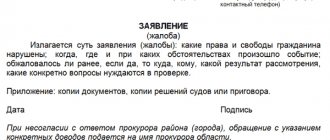Every person from childhood is instilled with respect for elders and rules of behavior in society. This can be briefly formulated as follows: “The junior must respect the elders, and the subordinate must respect the authorities.” It sounds somewhat militarized, but at work it’s like at war: without order, rules and subordination, any tactics will be a failure! Any process of joint work requires the placement of workers, timely control, as well as the debugging of relations between its participants. These relationships are always built on power and subordination. Respect by a boss for a subordinate and vice versa, mutual distance, compliance with established rules constitute such a concept as subordination. And most workers perceive it as a necessary condition of work, and not as an infringement of their rights.
Definition of the concept and content of subordination
Subordination comes from the Latin word subordinatio, meaning subordination, and is a system of official relations associated with hierarchy, the subordination of some managers along with their departments to managers of higher levels.
How to properly write a report about an employee’s inappropriate and boorish behavior?
At any enterprise there will be an employee who does not respect his colleagues, subordinates and sometimes even his superiors. In contrast to disciplinary offenses and improper performance of one’s duties, it is sometimes difficult to punish an employee for inappropriate behavior, since rules on inappropriate behavior are practically not found in the Labor Code of the Russian Federation (with the exception of teaching staff).
What is it like?
Service relationships can be vertical or horizontal. What is meant? The names speak for themselves. The first (vertical) are top-down (boss - subordinate) and bottom-up (employee - manager) relationships. When talking about them, by default they mean obedience to the orders of senior management.
https://youtu.be/TTa8_QLKA68
A real boss who adheres to the rules of corporate culture will never allow familiarity towards those who occupy lower positions. To avoid work troubles, distance must always be maintained, and in a mutual manner. After all, there are situations of inappropriate behavior on the part of employees towards the manager. This may be expressed in banter or inappropriately categorical tone.
Such familiarity backfires on employees. Those who regularly violate the principles of subordination are usually the first candidates for staff reduction. For his part, a leader who delves into the personal problems of his subordinates, is able to share private experiences with them, and forgives optionality and indiscipline, behaves short-sightedly and ultimately loses the authority due to his position.
https://youtu.be/CL0yBzSbJFc
What is meant by inappropriate behavior?
Since the concept of incorrect behavior, as well as punishment for it, is not prescribed in the main legislative acts, in order to be able to qualify the incorrect behavior of an employee, as well as apply punishment for it, it is necessary to include the above concepts in the local regulatory documents of the organization.
For example, in a collective agreement or in internal labor regulations.
The following actions can be classified as incorrect (boorish) behavior:
- offensive statements addressed to colleagues or clients of the organization;
- using profanity in relation to people or simply in colloquial speech;
- obsessive and rude behavior;
- obscene gestures towards colleagues and clients of the organization, etc.
These are just some of the main signs of inappropriate employee behavior.
This list can be continued almost endlessly, it all depends on the corporate policy of the organization and the scope of its activities.
What responsibilities should a technical director have in a company? For a sample technical director job description, see the link.
In addition to the above actions, this can include many others, including wearing revealing clothes if the company has a strict dress code.
Including a clause on inappropriate behavior in one of the organization’s local regulatory documents, as well as familiarizing the employee with them, is necessary so that the head of the organization has the right to punish the employee who committed this offense.
A sample act of failure to provide an explanation for the application of a penalty.
Who writes the report on inappropriate behavior?
Any employee who was present or the one to whom this behavior was directed has the right to draw up a report on the inappropriate behavior of an employee.
Calculating alimony from wages is not the easiest procedure. To correctly calculate child support, look at this material.
In addition to the memo, an act may also be drawn up in the presence of the commission stating that the employee behaved inappropriately towards employees or business partners of the organization.
Often, inappropriate behavior, in particular obscene statements addressed to someone, accompanies alcohol intoxication. So in this case, an employee can be punished twice for one seemingly wrongdoing.
For the appearance of an employee in a drunken state and for inappropriate behavior. But only on condition that the norms of inappropriate behavior and their prohibition are included in the local regulatory documents of the organization.
In this case, a memorandum or act is drawn up by a commission that records the fact that the employee is drunk.
Sample memo about boorish behavior of an employee
The procedure for drawing up documents stating that an employee has indulged in boorish behavior is no different from drawing up all other official memos and acts with which an official investigation begins.
Wage deductions must be documented. A sample writ of execution and instructions for drawing up can be found at the link.
The memo must indicate who behaved incorrectly, to whom such behavior was directed, and who was present.
It is also necessary to describe in as much detail as possible all the other circumstances of the incident. Very often the question arises as to whether to indicate specific statements in a report if they are considered non-normative.
A sample report can be downloaded from this link.
There is no clear opinion on this matter as far as the internal investigation is concerned. But if the case is brought to court, then it is necessary to indicate and, moreover, it is advisable to have witnesses.
The official investigation is carried out in accordance with the general procedure in compliance with the requirements of the law.
Since standards of conduct are often prescribed in internal labor regulations, violation of them can be classified as disciplinary offenses.
Sample memo about inappropriate behavior of an employee.
Employee Responsibility
An employee who indulges in inappropriate (boorish) behavior is usually subject to disciplinary punishment. Usually, depending on the severity, this is a reprimand or reprimand.
What are profitable investments in the material balance and in what cases are they taken into account? The answer to this question is in this material.
It is impossible to dismiss immediately for inappropriate behavior, since it does not apply to one-time serious ones.
But if the employee has already received a previously imposed disciplinary sanction for less than a year, then dismissal is quite possible, even if the previous sanction was imposed for a completely different offense.
In addition to punishment, according to the Labor Code, in this case, the norms of the Civil Code can also be applied, regarding insult to personality and dignity, and slander.
Both injured third-party citizens who have been insulted and directly employees of this organization can go to court.
There are precedents when a lawsuit was filed not against a specific employee, but against the organization as a whole, if the person who allowed himself to behave incorrectly (boorishly) held a high position.
How to document the receipt of goods? See the link for the rules for drawing up and a simple example of a goods acceptance certificate.
Also, the only way out for employees is to go to court in cases where the head of the organization allowed himself to behave rudely and incorrectly.
An example of a memo about an employee being late.
In any case, nowadays more and more companies have begun to pay attention to this part of employee communication as an important component of the business image of the enterprise.
Therefore, the norms for internal communication between employees, as well as with the organization’s clients, are increasingly prescribed in local documents, taking up more and more space there.
How to reflect business transactions in accounting? Detailed information is in this publication.
Although here, too, one should not get carried away and squeeze workers into a tight framework. Since there may be restrictions in current legislation. It is also appropriate to keep this in mind when creating a dress code for an organization.
You will learn how to write a report against an employee for insulting him from this video:
Sample memo about inappropriate behavior of an employee
At any enterprise there is an employee who is disrespectful to other subordinate employees, and sometimes even to management. Unlike offenses that violate discipline or improper fulfillment of assigned obligations, at times it is not easy to hold an employee accountable for incorrect behavior, since such norms are not found in the Labor Code of the Russian Federation (with the exception of persons involved in the field of education).
About rudeness and tactlessness
If you criticize your boss behind his back, such behavior not only violates the chain of command, but is also downright unethical. Such criticism will sooner or later reach the ears of management. And the biggest risks are those who are “smart enough” to highlight the incompetence of their boss in the event of a public conflict. Management, as a rule, does not forgive anyone for undermining their own authority.
Among the most tactless and gross violations of subordination are attempts to criticize not the official, but the personal qualities of employees. There is also a rude tone in the negative assessments of the work done, which in all cases without exception makes a painful impression.
When criticizing an employee or subordinate, it is important to maintain the desire to improve the work of both him personally and the entire organization. Attempts to discuss behavior should not be intended to humiliate or demonstrate power.
Sometimes in large and small teams, subordination at work, as well as the ethics of business communication, are completely absent. Small structures where everyone knows each other quite well are especially guilty of this. Addressing “you” is not always appropriate in a business environment; it blurs the lines between superiors and subordinates, and in such an atmosphere it is difficult for a junior in position to perceive management in its true light. His motivation to unconditionally follow instructions decreases.
What is meant by inappropriate behavior?
Based on the fact that the concept of incorrect behavior, as well as the norms of influence and punishment for it are not provided for in the main legislative acts, in order to be able to characterize, evaluate behavior as incorrect, and also apply measures for this, it is necessary to indicate in advance that for a specific organization is tactless, unacceptable behavior and introduce the above concepts into regulatory and internal documents.
For example, write down this concept and responsibility for it in an employment contract with an employee or in a list of explanations on internal rules of labor regulations and behavior in a team.
Taking into account the mentality and education of society, the basis for such behavior can be taken:
- offensive statements regarding colleagues, partners and clients of the company;
- the use of profanity addressed to someone else or simply in colloquial speech;
- annoying and rude behavior;
- inappropriate gestures towards colleagues, partners and clients of the organization;
- failure to comply or obvious disregard for instructions and instructions from senior management;
- illegal reduction or increase in working hours by a structural manager, without agreement with superiors and alteration of the staff work schedule;
- cancellation of the lunch break or a ban on leaving the workplace if necessary, etc.
The first step in dealing with such an employee may be to write a memo, because... Without the written preparation of this document, it is almost impossible to prove inappropriate behavior and identify the basis for it, as well as understand the situation with subsequent conclusions.
How to communicate with peers
Horizontal relationships are understood as those that are characteristic of communication between colleagues at the same level in their own environment. This also includes those that develop between managers who are equal in position. This is subordination between colleagues of the same “weight category”. Horizontal relationships are built on the principles of partnership and equality. The postulates of corporate ethics are based on friendly interactions in the work environment and fair distribution of workload.
Attempts to belittle and constantly pointlessly criticize colleagues are unacceptable. Any employee who professes this line of behavior risks irrevocably ruining relationships in the team. And not every manager will tolerate a troublemaker in the work environment.
We invite you to familiarize yourself with Sample acts of delineation of operational responsibilities for the supply of utilities
It is no secret that in any team there are sometimes cases of employees attempting to shift their own responsibilities onto the shoulders of colleagues, using, for example, friendly relations. But sooner or later, a slacker in the workplace is still identified and punished, both disciplinary and monetary.
Recommendations for design
The report on violation of labor discipline was assigned code 0286041 according to OKUD.
The document can only be of an informational nature; it provides information about the process of performing various works or the completion of events.
The reporting report notifies about the process or completion of the assigned tasks, assignments, instructions, and special work. By this, it ensures communication between the subjects of governance at the vertical level - from bottom to top - and is directed from a lower-level official to a higher-level one.
Depending on the address, notes can be:
- Internal - sent to the head of a structural unit or organization (in any form, no form required);
- External - addressed to higher authorities or governing structured bodies (mandatory on the organization’s letterhead).
The list of labor documentation, its forms, structure and samples, as well as requirements for preparation are given in the Labor Code of the Russian Federation. With the exception of an information and reference document, one of the types of which is a memorandum.
The document must be clear and structured and must not contain:
- manifestations of feelings or emotions;
- unnecessary information that does not relate to the essence;
- errors or lack of mandatory information that may cause the document to be invalidated.
Documents for download (free)
- Sample report on boorish behavior
You should not submit a report to management if:
- there is a personal hostility;
- there is no evidence of the incident;
- the kurtosis is not of a large degree and did not affect the efficiency of labor at all;
- the conflict situation was corrected in time.
Common mistakes
The third point is that two different people are appointed as executors of the same order. In this case, the work process can be disoriented, since there is a serious risk of the performers shifting responsibility to each other.
Very often there are cases of appealing to senior management, bypassing the immediate superior. It is customary first of all to notify the head of the department directly about a problem that has arisen.
The inability to set priorities also refers to manifestations of broken subordination at work. The performer’s task is to clearly understand what of the planned needs to be completed immediately, and what can be postponed for the coming days.
- A superior manager gives orders to an employee, bypassing his immediate superior. This may lead to a decrease in his authority; employees will no longer perceive the head of the department as a boss. This error disrupts the controllability of the system. The director should not take on additional responsibilities for personnel management.
- It is not the manager, but another person who controls the completion of tasks. Over time, the “controlling element” may become arbitrary and demand that tasks be completed at its own discretion. To avoid misunderstandings, you should immediately determine the powers of the employee controlling the process.
- Punishment of workers bypassing immediate superiors. Firstly, the director may not be in control of the situation. Second, such behavior undermines the value of the junior manager.
- Two people are assigned to solve one task. This slows down the work process, since each performer will hope that the other will do the work.
- Appeal to higher management, bypassing the immediate superior. If a problem arises, the department manager should be notified first.
- Lack of priority when setting tasks. The contractor must understand what work needs to be done immediately and what needs to be done in the next few days.
- Criticism of the boss behind his back. Among the members of the team there will probably be someone who will report unflattering statements addressed to him. An employee is especially at risk when he accuses his boss of incompetence during a public conflict. A leader may not forgive the undermining of his authority.
- Criticism of an employee’s personal rather than professional qualities. A negative assessment of work, expressed in a rude tone, always makes a lasting impression on the employee. Here it is important to make him understand that the criticism is based on the desire to improve the organization’s activities, and not on the desire to humiliate or show his power.
- Lack of ethics in business communication. Often in small structures it is customary to address each other as “you”, which blurs the lines between the links of the team. The junior in position ceases to perceive the senior as a leader and may not follow his instructions.
Differences from service and explanatory
In addition, it is worth distinguishing between the purposes of different types of internal organizational document flow and submitting a report when you can get by with a simple “service”.
It is often confused with service and explanatory, however, despite the similarity, replacing one with the other is unacceptable due to their purpose and distinctive specificity.
Distinctive features of a memo from a memo: type of statement - an official memo is strictly an internal document, while a memo is a document both internal and external, and can be sent to authorities outside the organization.
An internal memo provides a relationship at the horizontal-direct level “boss – employee of the same level”, and a memo – at the vertical-service hierarchy “employee-boss”.
A memorandum differs from an explanatory note in the semantic presentation and structure of the document. The explanatory statement consists of two parts, one of which reflects the fact that initiated its preparation, and the second explains why specific circumstances occurred.
Any employee who was present during the unusual situation or the one to whom this behavior was directed has the right to draw up and submit a report.
The report, in contrast to the explanatory and official report, is sent exclusively to higher management, authorized persons, and superiors. Information from the content is precisely intended to cause some kind of active action, which one depends on the goal, information and wishes.
The punishment may be:
- a written reprimand followed by a fine or dismissal;
- reprimand followed by a fine or dismissal;
- dismissal due to insufficiently conscientious attitude towards work or repeated warnings and reprimands.
Important: upon the first violation, dismissing an employee due to an insufficiently conscientious attitude towards work or towards the team without conducting conversations with him, warnings and issuing punishments is unlawful and illegal!
No other types of punishment are allowed. But each individual organization has the right to apply its own measures, which it deems necessary, within the limits of admissibility and norms.
Such measures must be specified in the employment contract with the employee or in a list and explanation of the internal rules of labor regulations and behavior in the team. The employee must be familiar with these requirements in advance.
The memo regarding inappropriate behavior refers to internal correspondence. This is not a verdict or a guarantee of the application of sanctions and punishments, but only a notification of an unusual situation in the team and the identification of violations.
The management reads, considers the appeal and makes a conclusion, makes its assessment of how justified it is to apply sanctions. The employee will definitely be given the opportunity to justify himself and explain the current situation. They write an explanatory note with their vision of the incident and an explanation of specific behavior.
If the employer finds the justification unsatisfactory, he will issue and sign an order for disciplinary action. According to the law, this can be a reprimand, reprimand and dismissal. If it is written unreasonably and is slander, and the employer discovers this, then the author will have to answer and face disciplinary punishment.
Subordination is a necessary element of corporate ethics. This is a set of rules of conduct, an important element of which is all the subtleties of the relationship between a boss and a subordinate. These are not just rules of good form and manners. Subordination ensures respectful treatment and productive work. For example, many managers face the following problem: they treat their subordinates very softly, as a result of which the latter begin to miss deadlines and perform their work poorly. It is difficult for a manager who does not respect the chain of command to point out the shortcomings of the work of his subordinate, who has become almost his friend. Rules help you save nerves and avoid conflicts.
Features of service relationships
There is no clear list of distinctive features of a working relationship, but we will try to highlight a few:
- hierarchy - each organization has an established vertical of power, documented in the job description, collective agreement, labor agreement. Here you will find out what rules are used to draw up the job description of the general director of an LLC;
- ethics – the legislation does not establish a clear line of behavior for employees and management. Norms of behavior and business communication are formed under the influence of ethical and moral principles and education;
- sanctions - non-compliance or non-compliance with generally accepted standards of behavior entails financial penalties, verbal reprimands, demotions, and dismissal. How to correctly draw up a disciplinary sanction order - read the publication at the link;
- improvisation – in our country there are no high-quality educational institutions that would teach corporate etiquette and the rules of business communication.
Regulation of official etiquette
If company management neglects to develop rules, this is fraught with chaos and confusion in the work process. Each employee should know who will help him, whose requirements he must fulfill, how much work his subordinate is ready to handle.
Large organizational structures build structural diagrams where the hierarchy between divisions and departments is clearly visible.
As mentioned above, the rules and norms of behavior are determined by: orders, the charter of the enterprise, labor and collective agreements, job descriptions. The rules for drawing up and executing a job description for a chief accountant are discussed here.
There is no legislative regulation of relationships, but Article 192 of the Labor Code of the Russian Federation lists the main types of disciplinary sanctions.
Labor Code of the Russian Federation Article 192. Disciplinary sanctions
For committing a disciplinary offense, that is, failure or improper performance by an employee through his fault of the labor duties assigned to him, the employer has the right to apply the following disciplinary sanctions: 1) reprimand; 2) reprimand; 3) dismissal for appropriate reasons. Federal laws, charters and regulations on discipline (part five of Article 189 of this Code) may also provide for other disciplinary sanctions for certain categories of employees. Disciplinary sanctions, in particular, include the dismissal of an employee on the grounds provided for in paragraphs 5, 6, 9 or 10 of part one of Article 81, paragraph 1 of Article 336 or Article 348.11 of this Code, as well as paragraph 7, 7.1 or 8 of part one of Article 81 of this Code Code in cases where guilty actions giving grounds for loss of confidence, or, accordingly, an immoral offense were committed by an employee at the place of work and in connection with the performance of his job duties. The application of disciplinary sanctions not provided for by federal laws, charters and regulations on discipline is not permitted. When imposing a disciplinary sanction, the severity of the offense committed and the circumstances under which it was committed must be taken into account.
Inner order rules
Recommendations to help you save your job:
- Do not make sarcastic and rude remarks directed towards a superior. If you have a constructive suggestion, express it politely.
- Closedness and reticence are the main vices when communicating with superiors. Try to show more interest in the conversation, do not answer in monosyllables.
- Address your superiors carefully, as your immediate supervisor will take this as a sign of disrespect on your part.
- If the team is given a task, but responsibilities are not assigned, do it yourself. Such a solution will increase efficiency and eliminate discrimination in labor activities.
- Don't make empty promises that you can't keep. Soberly assess your chances of success.
- Don't use your colleagues as a tool for self-realization.
- Try to take the initiative when solving non-standard problems, do not hesitate to express your opinion. Be a support for your superiors and other employees of the company.
Normative base
The rules of subordination are established by the company’s internal documents, such as:
- Collective agreement. It establishes the basic principles of interaction.
- Inner order rules. They indicate the work schedule and rules of conduct in the workplace.
- Job description. It indicates the specific responsibilities of the employee, as well as his status in the company hierarchy.
- Contract of employment. It stipulates individual rules for a specific employee.
Each company has the right to independently develop rules of subordination that are relevant for a specific space. However, they are all based on basic ethical standards.
FOR YOUR INFORMATION! Within the framework of the law, the rules of subordination are regulated by Article 192 of the Labor Code of the Russian Federation. Here is the responsibility for failure to comply with established standards.
How relationships are regulated
Relations in the work team are regulated by the following documents:
- an employment contract between the employee and the employer;
- job description;
- internal charter of the company.
In certain structures (in the army, in the authorities) there are special insignia, certificates and other distinctive features that regulate relations within the team. As a rule, the principle of subordination is the unconditional execution of the boss’s order, as well as mutual respect between the parties to the labor relationship.
Basic rules of interaction between company representatives
The norms of subordination depend on the type of hierarchy:
- Vertical. Assumes that the higher level gives instructions to the lower one. For example, a manager gives tasks to his subordinate. The latter is obliged to fulfill them.
- Horizontal. Involves interaction between employees of equal status.
Relationships that involve submission are traditionally considered difficult. Hidden conflicts often arise between the manager and subordinates, which complicate work. Subordination helps prevent problems. Its features depend on what kind of relationships are regulated.
Between subordinate and leader
Within a vertical hierarchy, the main role belongs to the manager. He has a great responsibility for healthy communication. Let's consider the basic rules within such relationships:
- Lack of familiarity. If a manager makes a subordinate his friend, it will be very difficult to give tasks or criticize work. The harshness of the boss in such a situation can lead to hidden conflicts and hostility. An example of familiarity is talking about personal life over a cup of tea. Naturally, a boss can communicate with a subordinate. However, you should stick to topics that are not too personal.
- Correct attitude. The employee, in turn, should not speak about his superiors in a negative tone. This does not mean complete submission. If the leader is a tyrant, the problem should be resolved legally.
- Politeness. If a subordinate wishes to propose any idea to the manager, he should do so as politely as possible. You must enter the boss's office only after knocking first.
- Maintaining hierarchy. You only need to contact your manager, and not this manager’s boss. Such jumping over a step can offend the manager.
- No insults. Disputes may well arise between a manager and a subordinate. And it is very important to conduct them correctly. In this case, differences of opinion will only enrich the work. During conflicts, you cannot insult a person based on his religious or political beliefs. It is strictly forbidden to point out flaws in appearance.
The manager needs to remember that he is the one who sets the main tone in the relationship.
Between bosses
Relationships between management can be either horizontal or vertical. In the first case, the status of the bosses is general. In the second case, a hierarchy is assumed. For example, there is a company manager, and there is a project manager. The former is higher in the hierarchy than the latter. Let's consider the rules of subordination within a given situation:
- Save time. Most conversations should be strictly business. There is no need to allow endless idle talk. You can talk about personal matters and joke after your work shift.
- Lack of subjectivity. When arguing, you should base your argument not on your personal views, but on documented facts.
- Correct attitude. Top management is strictly prohibited from scolding a lower-level manager in front of the latter's subordinates. This is a serious insubordination. Essentially, this is how a person creates a situation in which the manager’s subordinates stop respecting him. This will negatively affect all work processes. If an employee should be pointed out about his mistakes, it should be done face to face.
The respectful attitude of managers towards each other allows us to create a favorable climate in the company. It must be remembered that fish rots from the head. If management has conflicts, then ordinary employees will inevitably have them too.
Between subordinates
Less stringent requirements are imposed on subordinates. Let's look at the basic rules:
- Squabbles and gossip should not be allowed.
- It’s good if the atmosphere in the company is family-like, but it is not recommended to get too close. An employee may become a manager, but friendly relations with the staff will prevent him from giving instructions.
- You should not intercept clients from your co-worker. There will be a lot of clients, and you will have to “enjoy” a damaged relationship with a colleague every day.
- One should not make promises that a person is not sure of. A colleague may hope, which will lead to unfavorable consequences.
Subordination between subordinates is determined purely by the specifics of the company. For example, young creative companies have a friendly environment.
Punishment system
The rules of business etiquette ensure effective interaction between all employees: the behavior described by the code eliminates conflicts and quarrels between employees. Business etiquette is just conditional rules that can be changed by higher levels.
The established code is a model of relationships, the violation of which entails punishment. The boss is an authority, an unconditional leader. He demands respect and honor from every junior manager, subordinate or assistant: all business etiquette is built around him.
General discipline depends on the behavior of management. The disorganization of the head of the enterprise leads to chaos and disorder. The relationship between all team members allows us to establish proper work that generates income. Business etiquette is based on a system of assignments and recommendations and their implementation by each member of the team.
Situational rules of business etiquette: introductions
Relationships with the boss are built on 2 factors: the norms of the general work process and authority among subordinates. As the subordination is established initially, so will the relationships of the team develop.
The relationship between a boss and a subordinate is based on work discipline, a system of punishments and rewards. Discomfort in a team indicates violations of norms: the employee is uncomfortable communicating with his superiors, he avoids responsibility. In such conditions, employees on duty rarely take the initiative.
Business relationships between boss and subordinate involve:
- in case of failure to complete the task, an explanatory conversation is held with the employee;
- You cannot make comments to an employee in the presence of colleagues;
- the boss should avoid rude, unfounded claims;
- criticism from superiors should concern the employee’s professional actions.
The authority of higher levels is not built on rules alone: superiors should show fairness and restraint. Personal insults to an employee indicate the incompetence of the leading members of the team - such actions violate all discipline.
You cannot give personal advice to subordinates: a familiar attitude is unacceptable. There should be no doubt or panic on the part of the authorities. Even in difficult situations, employees must rely on his authority and competence.
Ethics of business communication: relationships in a team
Relationships in a team are always two-way: if management builds the right model of behavior, in response, employees should show flexibility, understanding and scrupulousness. If every employee in a team knows their duties and responsibilities, work goes faster and more efficiently.
The payment for his work and the attitude of his superiors depend on the behavior of a subordinate. First of all, a subordinate must create a healthy, calm atmosphere in his workplace: no one needs conflicting and quarrelsome employees. For management, the speed and quality of the work performed are important - the employee’s image is built on these two factors.
The employee’s polite and calm speech is important. The boss sets the tone of the meeting, but the employee on duty must show by example that there is no place for rudeness and inappropriate behavior in the work process. A categorical, harsh tone is not suitable for business interaction: monosyllabic answers create the wrong impression of a person.
We invite you to familiarize yourself with Keeping subordination is
Subordination is observed during work: if an employee does not take into account a superior employee, he undermines his authority before the team. Doubt about the professionalism of a higher level indicates a violation of the norms of business relations in the team. You cannot enter your boss’s office without knocking or not notify about your visit: the only exception is in emergency cases.
Partner - partner
A horizontal model of relationships is built between people who occupy positions of equal importance. The behavior of two partners at business meetings or at a meeting with subordinates is especially important. To avoid problems, the two partners must:
- maintain a calm tone, speak without jokes or familiarity;
- operate with facts and figures, do not use conditional, unsubstantiated information;
- do not react to attacks and criticism (even if the partner behaves aggressively, the second boss remains calm);
- An informative dialogue is a favorable basis for proper cooperation.
Equal partners must guide lower-level employees, their actions are coordinated and clear. It is important to demonstrate the competence of management personnel. The partner is shown respect: during the meeting, it is not advisable to answer phone calls or be distracted by other matters. At the end of the meeting, you should exchange business cards if it is a partnership, or agree on a schedule for future meetings - for managers in the same organization.
A telephone conversation should also be calm and informative; if your partner is busy, you should not insist on talking. You cannot use obscene words; such behavior will ruin the relationship and put partners in an uncomfortable position.
Rules for business communication with a partner
Violation of subordination entails punishment: depending on the established legislative norms and the personal charter of the company, the offending employee is reprimanded, reprimanded or fired. The offense determines the punishment.
Failure to comply with subordination at work always entails disciplinary liability: such rules should not be violated. Responsibility can be general or personal (one or more employees are punished). If the rules are violated once, a reprimand is issued, after which the employee receives more attention.
In case of insubordination and unsatisfactory work, it is recommended to conduct an explanatory conversation
Responsibility for failure to comply with the rules of subordination
Responsibility for non-compliance with the rules is stipulated in Article 192 of the Labor Code of the Russian Federation. In particular, these are the following measures:
- Comment. Provides a verbal indication of an employee's error. It is necessary to prevent incorrect actions in the future.
- Rebuke. Represents a written expression of your comment. A corresponding mark is placed on the employee’s personal card. A reprimand is a measure that is used after a reprimand is made. If an employee does not understand an oral comment, it is expressed in writing.
- Dismissal. This is the most severe disciplinary measure. Can only be used if the employee has been reprimanded several times. All of them must be properly formatted. You cannot be fired for insubordination itself. However, it is possible to terminate the employment agreement if there are repeated reprimands. In this case, dismissal is carried out on the basis that the employee has repeatedly violated his job duties.
IMPORTANT! An employee can only be fired if there are repeated gross violations of subordination. For example, an employee spreads gossip that discredits the business reputation of the manager, insults, or uses physical violence.
FOR YOUR INFORMATION! Insubordination implies negative consequences. In particular, the work of the company is disrupted.
Horizontal subordination
With horizontal subordination, all persons working in one team have equal status. In this case, the principle of equality and mutually beneficial cooperation applies. However, even in these relationships, distance must be maintained so that selfish employees cannot take advantage of such relationships. With such subordination, employees of the same level have equal responsibilities and volumes of work. Criticism of personal qualities and denunciations of colleagues are also not allowed.
Important! A fair distribution of responsibilities and a friendly attitude in such subordination will lead to the creation of a comfortable working environment in healthy conditions.
Disciplinary action for failure to comply with subordination
For example, there is a company manager, and there is a project manager. The former is higher in the hierarchy than the latter. Let's consider the rules of subordination within a given situation:
- Save time. Most conversations should be strictly business. There is no need to allow endless idle talk. You can talk about personal matters and joke after your work shift.
- Lack of subjectivity. When arguing, you should base your argument not on your personal views, but on documented facts.
- Correct attitude. Top management is strictly prohibited from scolding a lower-level manager in front of the latter's subordinates. This is a serious insubordination. Essentially, this is how a person creates a situation in which the manager’s subordinates stop respecting him. This will negatively affect all work processes.
Attention But there are several rules that make a leader successful: • If the boss appreciates the work of employees, he does not skimp on praise and adequate monetary reward. • The ability to take full responsibility for running a business at a critical moment. • The desire to fairly distribute work among subordinates. • Instructions are given without raising your voice, but also without entering into familiar relations. • The key principle is money only for work performed. • Orders are allowed only in exceptional cases or if the employee does not fulfill his obligations. The ability to take full responsibility for running a business at a critical moment is one of the most important qualities of a leader. The main documents, from the point of view of jurisdiction, are the organization’s charter and job descriptions.
Vertical chain of command
Vertical implies subordination from top to bottom and regulates the relationship between management and employees. Subordinates must treat their superiors with respect; familiarity and jokes are not acceptable. Likewise, the boss should not treat the employee as a slave or humiliate him. Also, management cannot share their personal problems with subordinates and, accordingly, ask about the problems of subordinates.
Important! If an employee deserves criticism, then this should be done in private, and not in front of all employees. You can only scold for business, for example, unfinished work, but you cannot get personal.
If the assignment is carried out properly, the employee should be praised. And this can be done with the whole team. The leader should always appear confident, give instructions clearly and not show a state of panic or confusion.
The disadvantages of this system of relations include totalitarian management on the part of the boss. Managers give instructions, but employee initiative is suppressed. This can lead to the fact that in the absence of a leader in non-standard situations, employees will not make the right decision and will not reveal their potential. The manager’s task is to stimulate employees to achieve high results. Therefore, it is sometimes possible to deviate from these rules in order to give employees the opportunity to express their opinions. In addition, it is even possible to involve the most proactive and capable employees in solving important employee issues and thus identifying them.
Labor subordination as a guarantee of organizational stability
A colleague may hope, which will lead to unfavorable consequences. The subordination between subordinates is determined purely by the specifics of the company. For example, young creative companies have a friendly environment.
Info Responsibility for non-compliance with the rules of subordination Responsibility for non-compliance with the rules is stipulated in Article 192 of the Labor Code of the Russian Federation. In particular, these are the following measures:
- Comment. Provides a verbal indication of an employee's error.
It is necessary to prevent incorrect actions in the future.
- Rebuke. Represents a written expression of your comment.
- Dismissal. This is the most severe disciplinary measure.
A corresponding mark is placed on the employee’s personal card. A reprimand is a measure that is used after a reprimand is made.
If an employee does not understand an oral comment, it is expressed in writing.
Colleagues
It is just as important for an employee to find a common language with his colleagues as with his boss. Communication needs to be done correctly from the very beginning so that common problems do not arise. Some, using a good attitude towards themselves, shift professional responsibilities to others. Others show their comrades in a negative light in front of the boss. To avoid this, you should follow some rules:
- when the boss gives a task, the work should be equally divided among all team members so that there are no slackers;
- it is necessary to avoid conflicts of interest and pulling over clients: a couple of clients will not help you get a promotion, but will spoil the atmosphere in the team, which is why you will have to work in a tense environment;
- if you can't help, don't promise it;
- You shouldn’t start intimate conversations at work, as this can lead to a deterioration in your relationship with your boss and colleague in the future.
The last piece of advice concerns the fact that you should not realize yourself at the expense of your colleagues.
Lawyer Directory
Article 192 of the Labor Code of the Russian Federation considers the types of disciplinary sanctions. Failure to comply with subordination at work entails consequences in the form of the following penalties: • Reprimand. •
Rebuke. • Dismissal on grounds of moral turpitude. A single violation of subordination causes a remark, after which the manager more carefully checks the quality of the employee’s performance of his duties.
Reprimands are issued both orally and recorded in a personal file. Disciplinary offenses, both isolated and persistent, become the cause of reprimands. An extreme measure, dismissal, is allowed in case of a gross one-time violation of subordination, potentially falling under an article of administrative or criminal violation (for example, beating a manager), or due to regular violations that negatively affect the situation in the team.
The procedure for familiarizing an employee with such an order is the same as when familiarizing himself with an order of collection. If within a year the penalty has not been lifted, but during this time the employee has not committed a single disciplinary offense, the penalty is canceled automatically and is considered as if the employee had never received it. Time limits for imposing a penalty The employer must impose a penalty on the offending employee within a month from the date of the offense. Later than six months from the date of commission of the offense, punishment cannot be applied; if the offense was discovered during an inspection or audit, the period is increased to two years. It should also be noted that the employer cannot impose two punishments for the same offense and cannot impose a fine for violation of labor discipline. In this case, deduction of bonuses is not a fine, since the bonus is a means of encouraging employees.
Pravoved.RU 1028 lawyers are now on the site
- Categories
- Labor law
Good afternoon Please tell me where exactly in the Labor Code of the Russian Federation the provisions on compliance with subordination and penalties for non-compliance are described? Collapse Victoria Dymova Support employee Pravoved.ru Try looking here:
You can get an answer faster if you call the free hotline for Moscow and the Moscow region. Available lawyers on the line: 6 Lawyers' answers (7)
- All legal services in Moscow Drawing up contracts for temporary work Moscow from 3,500 rubles. Reorganization by merger Moscow from 35,000 rub.
According to labor legislation, internal labor regulations must be developed and approved at each enterprise. Such a document serves as the main instruction for employees of the enterprise, and these rules prescribe all the nuances of the labor process and labor discipline: from the start time of the working day to the procedure for issuing bonuses and maintaining the trade secrets of the enterprise.
It would seem that there is such a particularly terrible thing if you come to work a minute later than the official start of the working day? But in fact, this is a violation of labor discipline, which can entail serious penalties. Let's try to figure out what compliance with labor discipline consists of, what offenses can be considered as a violation of it, and how this threatens the employee.
These include:
- rebuke;
- comment;
- dismissal.
At the same time, the employer also has the right to deprive the employee of a bonus (as part of a reprimand, if such a procedure is reflected in the internal documents of the enterprise). For a certain category of employees whose labor duties are regulated by separate Federal laws, other penalties are also provided.
Remark for violation of labor discipline Based on the fact of an employee’s misconduct, an act of violation of labor discipline must be drawn up, which must reflect the essence of the offense, the explanations received from the employee and the remark received. The remark in itself does not threaten the employee with any special troubles, but it will be possible to talk about a systematic violation of labor discipline if the employee commits another disciplinary offense in the near future.
Examples of violations of labor discipline
Practice knows many examples of violations of labor discipline. Most of them relate to minor offenses and are often limited to verbal remarks.
For example, employee Ivanov. A.A. violated work regulations by showing up for work an hour later than scheduled without a valid reason. In this case, the employer may limit himself to a verbal warning, which is issued in the form of an act of disciplinary violation
.
In case of systematic delays, Ivanov A.A. a reprimand may be issued
, but the law does not allow a reprimand to be issued immediately after the first offense.
A reprimand may result, for example, from failure to fulfill his official duties by the warehouse manager V.V. Petrov, which resulted in financial losses for the enterprise in the form of failure to sign an agreement with suppliers. The employee may be given a regular or severe reprimand
(at the discretion of the employer).
A one-time violation that entails dismissal can be an employee’s appearance at the workplace in a state of intoxication, theft of official property, or actions that provoked an accident or accident at work.
Any decision on disciplinary action may be appealed by the employee in court. Then the help of a professional lawyer competent in matters of labor legislation of the Russian Federation will be relevant.
https://youtu.be/q86JvULFFXQ
Disciplinary action for failure to comply with subordination at work
If an employee should be pointed out about his mistakes, this must be done face to face. The respectful attitude of managers towards each other allows you to create a favorable climate in the company. It must be remembered that fish rots from the head. If management has conflicts, then ordinary employees will inevitably have them too.
Between subordinates Less stringent requirements are imposed on subordinates. Let's look at the basic rules:
- Squabbles and gossip should not be allowed.
- It’s good if the atmosphere in the company is family-like, but it is not recommended to get too close.
An employee may become a manager, but friendly relations with the staff will prevent him from giving instructions. - You should not intercept clients from your co-worker. There will be a lot of clients, and you will have to “enjoy” a damaged relationship with a colleague every day.
- One should not make promises that a person is not sure of.
Purpose of subordination
Subordination is necessary for all managers who want their employees to work harmoniously and produce high levels of labor productivity. If corporate ethics is observed, work is organized correctly. An individual employee clearly understands his responsibilities, whose orders he must follow and who to contact.
When hiring a new employee, the employer must familiarize him with the rules of corporate ethics. If the organization values the work of people and respects all sides of the relationship, then subordination occurs naturally. And there is no need to force employees to comply with subordination in such companies (
Reprimand for insubordination sample
Responsibility for violation of labor discipline According to labor legislation, each employee is responsible for compliance with labor discipline at the enterprise and each employee must be familiar with the internal labor regulations, labor protection documents, job descriptions and other documents regulating his work activity, against signature. If an employee violates labor discipline, the employer has the right to apply penalties at its discretion, depending on the severity of the offense.
The procedure for punishment for a disciplinary offense Punishment for violation of labor discipline is established by the head of the enterprise on the basis of legal norms and available information. Act on the commission of a disciplinary offense When an employee commits any disciplinary offense, a corresponding act is drawn up.
What is labor discipline?
Labor discipline
is a set of rules developed by an enterprise in order to optimize the work process. It is based on the responsibilities of each employee prescribed by law.
Article 21 of the Labor Code of the Russian Federation “Basic rights and obligations of an employee
:
“The employee is obliged:
- conscientiously fulfill his labor duties assigned to him by the employment contract;
- comply with internal labor regulations;
- observe labor discipline;
- comply with established labor standards;
- comply with labor protection and occupational safety requirements;
- treat with care the property of the employer (including the property of third parties owned by the employer, if the employer is responsible for the safety of this property) and other employees;
- immediately inform the employer or immediate supervisor about the occurrence of a situation that poses a threat to the life and health of people, the safety of the employer’s property (including the property of third parties located at the employer, if the employer is responsible for the safety of this property).”
In addition to the basic requirements, labor discipline rules may also specify other responsibilities of employees related to the specifics of each organization.
Reprimand for insubordination
If the employee has provided an explanatory note, an act of violation and a report from the employee’s immediate superior are attached to it. This package of documents is transferred to senior management in order for a decision on recovery to be made.
Order to impose a penalty After studying the circumstances of the disciplinary offense committed and studying all the documents, the head of the enterprise issues an order on violation of labor discipline. There is no standard form for such an order (except for the dismissal order, which is drawn up according to forms No. T-8 and No. T-8a, approved by Resolution of the State Statistics Committee of Russia dated January 5, 2004 No. 1 “On approval of unified forms of primary accounting documentation for labor accounting and its payment"), but the document must reflect the disciplinary offense, the time and date of its commission, the type of penalty and list the regulatory documents.
Related topics:
- Which persons are allowed to work at heights Age limit - a 4-letter word Definitions from scanwords of the word CENZ Citizens' census...
- Violation of safety rules Article 143. Violation of labor protection requirements1. Violation of labor protection requirements committed by a person entrusted with...
- Wiretapping at work Topic: Is it legal in Russia to listen to employee conversations? In order to get employees to work, many...
What to watch out for
https://youtu.be/JJ_rXNk418o
What are the consequences of non-compliance with subordination at work? All manifestations of familiar relations with management, failure to follow his instructions, and incorrect criticism, one way or another, affect the business foundations of the enterprise and significantly reduce the authority of management. As consequences in such corporations, one can observe rampant disciplinary measures in the form of reprimands, comments, deprivation of bonuses, etc. Well, the extreme measure of retribution for errors against subordination is dismissal.










